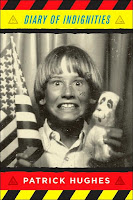 The Foreign Correspondent
The Foreign CorrespondentAlan Furst
Random House, 2006
273 pages
In the late 1930's hundreds of intellectuals had fled Mussolini's iron grip in Italy and settled in large communities in Paris where they waged a covert war of words against Il Duce through hundreds of journals and newspapers. In this case the title character, one Carlo Wiesz, begins as a foreign correspondent for Reuters and slowly becomes entangled in this world of underground newspapers and espionage. Part of me wants to call this another rip roaring tale of espionage but however much I may have enjoyed the book and read through it very quickly, it is not a fast moving story. Furst, as always, slowly builds towards the inevitable conclusion for his character, all the while showing us a Europe unfamiliar to most readers and yet somehow well known. I cannot recommend this book enough.
 The Polish Officer
The Polish OfficerAlan Furst
Random House, 1991
287 pages
In Warsaw in 1939 Captain Alexander de Milja is given charge of the national gold reserve of Poland. His orders are to transport the gold to Bucharest and keep it out of Nazi hands. This mission is the beginning of his service in the intelligence arm of the Polish underground. His assignments take him from Paris to Warsaw to the forest of the Ukraine, all in service of a country which, for a time, only exists in the hearts of her people. Of the four Furst novels I have read so far The Polish Officer is far and away my favorite.
 Heroes Volume One
Heroes Volume OneVarious
Wildstorm, 2007
235 pages
While not a book per se, I did not feel like creating a separate entry just for this, which can only be loosely referred to as a graphic novel. This volume is a collection of the Heroes comics which appeared online during the first season of the show. While this volume is in no way essential to understanding the events of the show, I did enjoy the several chapters which gave us the back story for Hana Gitelman (played by honorary future ex-wife Stana Katic in the series), aka Wireless, and the tale of her ultimate demise. I hope they use this in some of the forthcoming episodes. In the end this was an enjoyable read but not really worth the money unless you are a fanboy.
 Guests of the Ayatollah
Guests of the AyatollahMark Bowden
Grove Press, 2006
680 pages
As with the other books by Bowden which I have read, Black Hawk Down and Killing Pablo, the title truly sums up the book. In this case Bowden examines the circumstances which lead up to the events of 4 November 1979 and the following 444 days where a group of Iranian students managed to hold the United States hostage. Once again Bowden succeeds by showing the reader how these events, now twenty-five years gone, still reverberate in the world today. Every one should read this book as more than any other event the hostage crisis is what drives the U.S.-Iran relationship to this day.
 Submerged: Adventures of America's Most Elite Underwater Archeology Team
Submerged: Adventures of America's Most Elite Underwater Archeology TeamDaniel Lenihan
Newmarket Press, 2002
287 pages
I picked this book up while visiting the USS Arizona Memorial in Pearl Harbor. The idea of the book, which is to document the formation and first several years of the National Park Service's Submerged Cultural Resources Unit, or SCRU (which has since been renamed the Submerged Resources Center), appeals to both my interest in history and my newly acquired hobby of SCUBA diving. In this book Lenihan, who was the founder and leader of the SCRU for several decades, ably charts the history of the unit through the time honored tradition of telling tales of their more exciting adventures. The success of this book is that rather than a dry and academic treatise on the SCRU and the issues surrounding their work, Lenihan's style is conversational and he manages to avoid ever talking down to the audience. I really enjoyed this book.
 Missile Gap
Missile GapCharles Stross
Subterranean Press, 2006
99 pages
I purchased this book on a whim while poking about the Subterranean Press website and let me tell you the $35 cover price was a bit disconcerting. Seeing as how the book combined hard science fiction, a genre in which I am trying to renew my interest, and alternate history, a genre that I always find interesting, I thought it was worth the risk. I was relieved when upon finishing the book I was able to judge my gamble a success. Weighing in at a slight 99 pages, Missile Gap tells the story of a world which while familiar to readers is vastly different from our own. On the eve of the Cuban War of 1962 everything changed. The world suddenly became flat, the constellations were no longer correct, and rockets launched from the surface of the planet were not able to make orbit. In addition to this there are new and massive seas which connect our familiar Earth to new continents. The year is 1976 and Cold War continues apace with Britain standing as the last bastion of freedom in Europe, the rest of the continent having falling under the Soviet control and man is just starting to explore these new continents, moving across what has become known as the Boreal Ocean to establish colonies on the new land. While this is going on others struggle to prevent the scourge of communism from enveloping the remnants of the free world and yet others strive to understand what has happened to our world. While this may seem like a lot of ground to cover in just 99 pages, Stross does so masterfully, giving the reader enough to understand what is happening without delving into the minutiae of his characters day to day lives. I really enjoyed this book and look forward to tracking down his other works and adding them to the growing mound of reading I have yet to tackle.
 Red Dwarf: Infinity Welcomes Careful Drivers
Red Dwarf: Infinity Welcomes Careful DriversGrant Naylor (Rob Grant & Doug Naylor)
Penguin, 1989
298 pages
I blame this book for derailing the whole review process. (Well this book and the damned television, but we won't get in to that here.) I have started to review this book three or four times and each time I throw my hands up in frustration and wander off in search of easier prey. The problem with this book is that the entire concept of Red Dwarf defies description. Yes, red Dwarf is the story of one young drunkard name Lister who, after a heck of a birthday party finds himself stranded on one of Saturn's moons with no way to get back to Earth. To get home he enlists on the Red Dwarf, a mining vessel headed back to Earth. Since Lister is an incorrigible slacker he soon figures out that by getting himself put into stasis he can make it home without actually having to do any work. The one flaw in Lister's plan is that the Red Dwarf suffers a radiation leak which kills the entire crew and traps Lister in stasis for a million years or so. After the computer revives Lister the true fun begins as his only companions are the computer, who has gone a bit batty after being alone for a million years, the hologram of Arnold J. Rimmer, Lister's annoying roommate aboard the Red Dwarf, and Cat, the evolved descendant of the cat Lister snuck on board. Hilarity of the British persuasion ensues. My main worry about the book going in was that it would only really be accessible to fans of the show, of which I am one, since a lot of the humor depends on the interplay between the various characters, however the book captures that interplay brilliantly. If you are a fan of the show I definitely recommend this book and if you do not know anything about the show then you may want to check it out. It will not be a waste of your time.
 Harry Potter and the Deathly Hallows
Harry Potter and the Deathly HallowsJ. K. Rowling
Scholastic, 2007
759 pages
So here it is. After nine years and three-thousand three-hundred forty-one pages we have reached the final entry in the Harry Potter epic. When I started to read this book I had it in the back of my head that this book was going to suffer from the same impossible to meet expectations that plagued the Star Wars prequels. Fortunately for us all Rowling was able to craft a very satisfying end to her series. Can you just imagine the chaos if she had tanked? It would be like Dawn of the Dead meets the Kids Choice Awards set in Compton and nothing good can come of that! In this book she manages to tie up all of the loose threads in a manner which is consistent with the world she has created. I do not want to delve in to the book any more than that, really, in case one or two of you have not read it yet. We will leave it at the acknowledgment that the book is a satisfying end to the story and even includes one of those ten-year later post scripts that will play during the credits of the final film.
 Diary of Indignities
Diary of IndignitiesPatrick Hughes
M Press, 2007
255 pages
This is the second time I have been suckered into buying a book comprised of material which you can read on the author's website for free, the first being Wil Wheaton's Just A Geek*. As an aspiring writer myself I do not mind paying for these books, particularly in these two cases as they are by turns poignant and funny to the point of tears. Patrick Hughes, whose website can be found here, is truly a larger than life character who is a danger to both himself and others and endowed with a razor-sharp wit which he uses to eviscerate his life and those around him. There is really nothing I can say about this book except encourage you to go and check out his website for samples. This is perhaps my favorite single story there, however his illustrated trip to the local Ren Faire is funny in a very sad I've been there and seen that sort of way. Once you have read those two stories you must go buy the book. The power of Christ compels you.
 Dark Star
Dark StarAlan Furst
Random House, 1991
437 pages
The second of Alan Furst's espionage novels set in Europe during the the lead up to World War II. Again it has been so long since I read the novel that I cannot communicate any useful information about the novel except that I very much enjoyed it and would unreservedly recommend it to anyone.
 Requiem for an Assassin
Requiem for an AssassinBarry Eisler
Putnam, 2007
350 pages
This book will serve as an example of how backed up I have been on book reviews. The book was released on May 22nd. Before May 22nd I managed to score and read an advanced copy of the novel. My slacking knows no bounds. At this point it has been so long since I read the book I cannot safely comment on it except to say that I remember enjoying it very much and am once again looking forward to Eisler's next offering.
* Incidentally Wil recently finished his latest book The Happiest Days of Our Lives. If it is half as good as Just A Geek then it is well worth your time and hard earned ducats.




















